- Home
- Patrick Ness
Burn Page 7
Burn Read online
Page 7
“Yeah, I guess that’s true,” Nelson said, concentrating on his cigarette. “I’m heading that way. I could give you a ride.”
Malcolm perked up. “Ride?”
“Yes, ‘Malcolm McCormack’”—saying the name in a way that clearly didn’t quite believe it—“I have a truck.”
Nelson nodded past his tent and, sure enough, a truck sat parked, not in the campground’s lot but in some trees on the other side, as if he had hidden it.
Here was a tantalizing possibility. Rides were a last resort, but it was day three and he was behind. There were only fourteen days to go. What if the snow slowed him down more? What if the men who shot him had colleagues who were still searching? What if—?
“You a Believer?” Nelson asked, nodding at Malcolm’s exposed wrist.
Malcolm pulled down the sleeve to cover the tattoos.
“It’s okay,” Nelson said. “Everyone says you people are crazy, but I’m not prejudiced.” He exhaled smoke through his nose. “As long as no one gets hurt, what people do is their own business.” He looked into Malcolm’s eyes again. “You get me?”
“Maybe I do,” Malcolm, who didn’t, said.
Nelson flicked the end of his cigarette into the campfire and got up for a stretch. “Were you thrown out?” he asked, not looking at him. “By your parents, I mean.”
“I never knew my parents,” Malcolm said. “The Believers took me in as an orphan.”
“Someone there must have been your parent. Canada doesn’t let churches adopt whole people.” Nelson sat back down next to him, a little closer this time. Malcolm didn’t mind. It increased the warmth. “Kind of stops slavery, I think.”
Malcolm thought of the Mitera Thea. “There was a woman who took me in.”
“So she’s your parent. Even if the ones you’re related to are dead, you still got a mother.”
“Yes.”
Nelson was silent. It took Malcolm a second to realize what he was supposed to say next. “Were you thrown out?”
Nelson nodded. “By my own mother, too. The one who gave birth to me.”
“Why?”
Nelson stayed silent but met Malcolm’s eyes again. Nelson’s were brown, but light and striking. His skin was darker than Malcolm’s and a lock of black hair stuck out from beneath the woolly cap. Malcolm had a strange moment of wanting to brush it back under the wool, had his hand halfway up, in fact, before stopping himself, mainly because Nelson hadn’t moved.
In an instant, Malcolm grasped it, all of it: He’d been told about this, that it might happen to a young man traveling alone.
He’d been instructed what to do.
To his surprise, Malcolm found himself wondering if those instructions might be put off another moment or two.
“It’s snowing harder.”
“I can see that, Agent Woolf.”
“He’ll be looking for shelter.”
“He wasn’t looking for shelter at the last three places.”
“My point is that he may have been driven into one of the next two by the weather.”
It was starting to annoy him how often she was right. “So do you still believe?” he asked her, as they drove through the thickening snow.
“I’m no longer a Believer, Agent Dernovich,” she said, and for the first time, he heard a little annoyance in her voice. At last, he thought.
“Yes,” he said, “but that’s different than whether you still believe or not. People leave churches. Doesn’t mean they leave their faith behind.”
In an incredible happening, Agent Woolf laughed. “I think,” she said, a rich, surprising humor in her voice, “you may not really know what Believers believe.”
He bridled. “I’m one of the leading Believer experts in North America, Agent—”
“Yes, but the real truth of it? How much do they believe is literally real versus how much is symbolic?”
He sighed, just to annoy her. “It’s understood that key elements of the faith are allegorical—”
“But you want to know if I literally believe dragons are angelic representatives of an afterlife on earth? If the purpose of a man or a woman is to serve that divine representative and not push them onto reservations? If we were vomited from the stomach of a great dragon Goddess—”
“I just want to know who you pray to,” he said, a little too hard. “If we meet a dragon, do I need to watch my back?”
“You always need to watch your back when you meet a dragon, Agent Dernovich,” she said. “Surely whoever you pray to would agree with that.” She nodded out at the road. “It’s the next turn.”
“That looks messy,” Nelson said, as Malcolm took off his hat. The bandage on his ear was on the point of falling off, and it was time for a new one.
“It’s not so bad,” Malcolm said.
“You want me to do that?” Nelson asked as Malcolm fumbled with the new bandage.
He felt bashful, but said, “Would you? It’s hard when you can’t see.”
Nelson positioned himself in front of Malcolm. He took off a last bit of bandage stuck to Malcolm’s ear, and Malcolm could smell the tobacco on his fingers.
Nelson whistled in admiration at the wound. “What the hell happened to you, Malcolm McCormack?”
Malcolm tried to remember what he’d told the pharmacist, but the closeness of Nelson had made his mind go quite blank. “I fell,” he said, weakly, noticing the faint stubble across Nelson’s chin.
“Baloney, you fell,” Nelson said, but not in a taunting way.
“I got shot,” Malcolm said, unexpectedly.
Nelson sat back. “Yeah, that sounds a bit more like it.” He unrolled the new bandage and started pressing it into place. Malcolm winced. “I don’t have any painkillers.”
“My faith doesn’t believe in them.”
“And that makes the pain go away, does it?” But he didn’t push, just took some adhesive tape and gently set the bandage in place. He finished, once more meeting Malcolm’s eyes. “Who would shoot Malcolm McCormack the Believer?”
Nelson reached out to brush a snowflake from Malcolm’s cheek. Malcolm smelled the tobacco again along with the warm, worn smell of another person. He tipped his nose up involuntarily to follow Nelson’s hand as it left his face. There was a silence, and Nelson’s look was more serious now.
“Is this the time that you kiss me?” Malcolm asked, genuinely curious.
“Is it what, you dipstick?” But Nelson was still smiling. “Kiss you? You want me to kiss you?”
“Have I misunderstood—?”
“You just come right out and say it?”
“I’m sorry, I—”
“You got a woody down there, too?”
Malcolm blinked. “A what?”
Nelson laughed out loud. “Are you for real?”
“I’m not sure. We’ve got a slightly different approach to reality.”
“Do you now?”
Malcolm nodded. “Some of us believe this is all a dream. That reality, whatever it is, never had dragons in it, that this world existed for thousands and thousands of years with just men, until one day, we entered a dream where dragons were with us. Had always been with us.”
Nelson’s eyebrow twitched up in a way that Malcolm found oddly stirring. “That sounds like more of an argument why you shouldn’t be a Believer.”
“It’s more of an argument about why we should never wake up.”
Nelson laughed again, but his confusion was plain. As was a surprising amount of pain. “A world where you never wake up? Sounds like paradise.”
“What do you mean—?”
He stopped because Nelson’s face had frozen in a glance over Malcolm’s shoulder. Malcolm turned.
A black Oldsmobile was pulling up in the campground parking lot.
“Did you get the license plate?” Agent Dernovich asked, out of breath, near the fire the two boys had run from.
“Just that the first numbers were forty-seven,” Agent Woolf said, already scribbli
ng in her notebook.
“It was him, though, wasn’t it?”
Woolf eyed him. “Maybe.”
“Oh, come on.” Agent Dernovich stood now, still out of breath, hand on his side. It hadn’t even been much of a dash after they saw the boys take off. He really needed to cut down on the apple pie and ice cream. “Who else could it have been?”
“We wouldn’t expect our target to have made friends.”
“Friends? Why did they have to be friends? He could have forced the other one to take him. Or they could have—”
“Agent Dernovich,” she said, in a way that stopped him. He saw her bend down by the tent the boys had abandoned, though he’d had a first glance while Agent Woolf—not winded at all—had chased after them as they peeled away, fast as criminals, in a truck that neither agent had seen parked there, disappearing before there was any chance of getting back to the Oldsmobile. He hadn’t seen anything in the few belongings left in the tent that indicated that the second boy, whoever he might be, was any sort of Believer.
But that’s not what Woolf was picking up from the snow. With the tip of her notebook pencil, she had hooked a snow hat. She spun it around to show Dernovich a side that was bloody and torn.
“At last,” Dernovich said. “Proof.”
“Proof that it’s the boy we’re after. Not proof that he’s our target.”
“Oh, for pete’s sake, Woolf!” he said, finally shouting, letting all the frustration out at once. “We have who knows how little time to stop someone from fulfilling a so-called prophecy that just might start an all-out war between men and dragons, and you, of all people, however former a Believer you might be, know damn well that that is a war we do not want. It’s goddamn proof enough.” He stopped, took in a deep breath, losing steam. “Because it’s all the proof we’ve got.”
“I know full well what we’re facing,” she said, her face stern. “I know better than you.”
“Then you won’t complain when I ask you to find a pay phone and tell the Canadians we’ve got an assassin on the loose, now, will you? Let that cat out of the bag. Go! I’m going to keep searching through this stuff.”
She didn’t even say yes as she hurried back to their Oldsmobile. He blinked away the snow as he watched her. So close. So close. But the way the boy (and the other boy, whatever poor unfortunate that kid turned out to be) had run. It couldn’t be anyone else.
They’d found him. And Cutler could go sit on a pole if he doubted them again.
“I lost my tent,” Nelson said, driving.
“I’m sorry.”
“I had a sleeping roll in there.”
“I’m sorry.”
“You’re just lucky most of my stuff is still in here.”
Malcolm looked in the small cavity behind the seats of Nelson’s truck. The entirety of Nelson’s belongings barely even matched Malcolm’s, carried in the bag he’d run with, though now minus a hat.
“I’m sorry,” he said again.
“Why’d you run?” Nelson demanded.
Why did you? Malcolm wondered. Nelson had followed him without a pause, had raced away in the truck like the road was on fire.
“Because,” Malcolm said.
“Not an answer.”
Once more something about the other boy startled Malcolm into telling the truth when he knew he really shouldn’t.
“Because I didn’t want to have to kill them.”
Seven
FROME—THE TOWN, her town—was convinced Deputy Kelby had been murdered. His car had been found, parked near the diner where Jason worked, but he had, so far, not returned to the home where his elderly mama had spent the last three days crying for him, if maybe not as hard as one might expect. Kelby’s logbook was more than two weeks out of date, so that was no help, and he’d told no one where he was going or what he was doing on the night he vanished.
Sheriff Lopez was pulling his hair out. He’d even talked to Jason briefly, as a quick add-on to an interview with Al when Jason was at work the next night (in a clean shirt). Lopez asked Al if he’d seen Kelby park his car, Al had said no, had called to the back, “You see him, Jason?” and Jason had only had to lean out a door and truthfully say, “No, I didn’t see him park the car.” Lopez had quickly moved on to those citizens of Frome who had way more reason to have a grudge against Kelby than skinny Jason Inagawa.
Town feeling was that Kelby’s body was probably buried somewhere deep in the forest that enclosed Frome on every side. Someone had finally had enough of Kelby’s hateful nonsense and put him out of his—and no doubt their—misery.
Only one person came close to suspecting anything near the truth.
“Tell me again how you fell?” Gareth Dewhurst asked his daughter over dinner.
“Against the counter,” she said, wincing at the pain in her jaw. It was bruised and obviously swollen. She hadn’t slept after getting home the night it happened (how could she? She might never sleep again) and made sure to rise before her father, listening for him to start downstairs for breakfast. At which point, she dropped herself to the ground as hard as she could, calling out.
He’d come running in, helped her up, taken her to the doctor, who’d confirmed her jaw wasn’t broken, though she was likely to lose another one of her back teeth. She’d been off school since. Jason had delivered her homework each day. He told her what the town was thinking, and she told him to try not to panic, that it was an accident, that Kelby was going to kill him, that there was no evidence anyway since Kazimir had . . .
Well, that was the other thing. She’d been at home three days and the whole time, her father, perhaps suspiciously, perhaps not, had never given her a single chance to be alone with the dragon. The one time she’d tried to sneak out at night, she’d found her father in the kitchen, reading a newspaper by lantern light.
“Can’t sleep?” he’d asked.
“No,” she said. “Bad dreams.”
He hadn’t looked up from a newspaper she knew for a fact he’d already read over dinner that evening. “And what might a girl like you be having bad dreams about?”
“Mom,” she’d said, which was true, actually. She’d dreamt her mother had been swallowed by a dragon, though a more familiar red than the blue still working their back fields. She wanted her mother so much right now, somehow even more keenly than she had in the two years since her death, if that was even possible.
Her father hadn’t said anything to this, just let her go back to bed after a glass of milk, but she hadn’t tried to go out again since then.
And now this, the third day in. “Tell me again how you fell?”
“Just clumsy, I guess.” She’d made them both baked beans, as it was about the only thing she could comfortably eat.
“Tripped over your own feet?”
“Must have.”
“And bashed your face against the counter.”
“Yes, sir.”
“Nearly breaking your jaw and losing a tooth.”
“I must have swallowed it.”
“But making no discernible damage to the countertop itself.”
“Solid oak.”
“Solid oak,” he said quietly. He took a bite of beans, then he stood and walked his plate to the sink.
Where he raised his fist and smashed it into the counter, easily breaking a board out of the top and cracking another. “Except it’s not, is it?” he said, not looking at her. “We’re not people who can afford solid oak anything.”
She swallowed, forgetting the pain of it until she was halfway through. “Daddy—”
“Do I really want to know why you’re lying to me, daughter?”
She was surprised that it was a serious question. She saw him itching his fingers together, for all the world like he wanted to hit something again. Not her, but something specific.
“Did Jason Inagawa lay a hand on you?” he asked.
“No!” she said, startled into making her voice loud. “He would never!”
“Don’t
think I haven’t noticed you two. That you’re clearly more than just friends.”
“Dad, I swear to you—”
“If he hurt you, I would kill him.”
She knew he would. Knew it. Not in the way people say they would kill other people all the time. Seeing her father standing there, right this moment, his body tensed and somehow buzzing with an energy only amplified by his stillness, she knew. He really would kill Jason Inagawa. Or anyone else who dared harm his daughter. This knowledge was surprisingly frightening.
“He would never hurt me, Dad, not in a million years.”
Another few breaths, then the energy was lessened. Not gone, never gone, but less. “I’m not complaining if you two are more than . . . whatever. I’d be the last person telling you that.” Then, more quietly, “If not for the pain I know the world will give you for it.” He looked up at her again. “But he’s not laying hands on you?”
“I swear it. Do you really think I’d ever put up with that?”
He frowned. “No. No, I guess you wouldn’t.”
“I fell, Dad, that’s all.”
“You fell.”
“Yes.”
He walked quietly over to pick up his hat as a prelude to heading out to his farm work. “I wonder where, though,” he said, then left before she could answer him.
“Why did he let me lie?” Sarah asked Jason, finally back in school, in the library again. He had no injury, so he’d had to go back the very next day, pretending nothing was wrong.
“We have bigger things to worry about,” Jason whispered back.
“Is your dad being weird, too?”
Jason shook his head. “No one saw the shirt but . . .” He closed his eyes, took a deep, nervous breath. “I’m going freaky with this, Sarah.”
“It wasn’t your fault—”
“Who cares about fault? I shot him. And then your dragon—”
“Lower your voice—”
“Your dragon,” in a fiercer whisper, “ate him.”
“I don’t understand it either. I still haven’t been able to talk to him.”
“What are we supposed to do, Sarah? Lopez is going to run out of people who didn’t kill Kelby and then where is he going to start looking?”
She glanced around the library. As usual, they were pretty much the only two students in it, aside from Claudia Caswell, who would pull out her own hair and eat it if she didn’t have a book in her sticky fingers. And Miss Archer was . . . Miss Archer was there a minute ago.

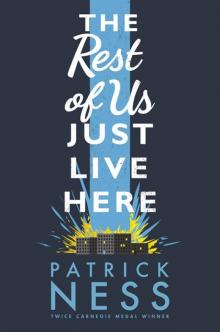 The Rest of Us Just Live Here
The Rest of Us Just Live Here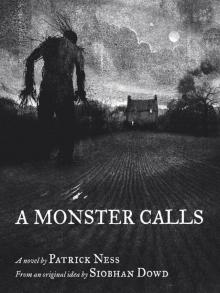 A Monster Calls
A Monster Calls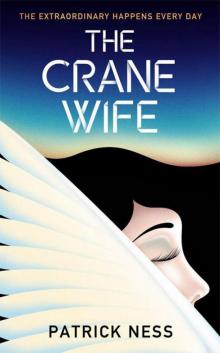 The Crane Wife
The Crane Wife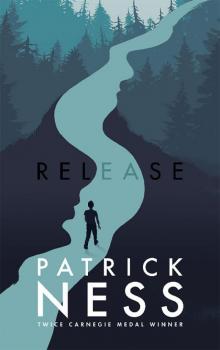 Release
Release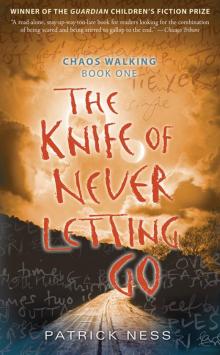 The Knife of Never Letting Go
The Knife of Never Letting Go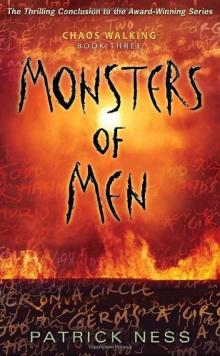 Monsters of Men
Monsters of Men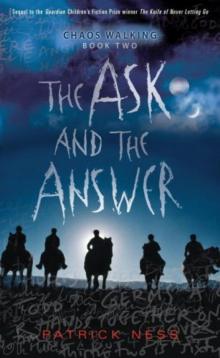 The Ask and the Answer
The Ask and the Answer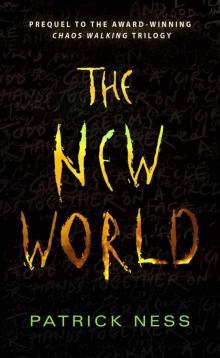 The New World
The New World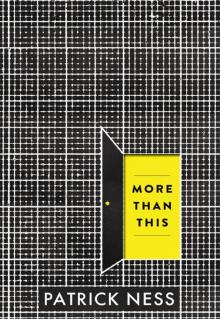 More Than This
More Than This Burn
Burn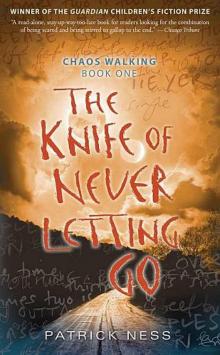 The Knife of Never Letting Go cw-1
The Knife of Never Letting Go cw-1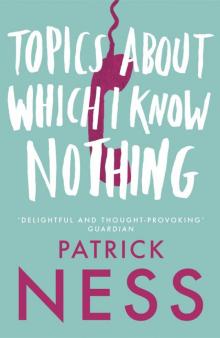 Topics About Which I Know Nothing
Topics About Which I Know Nothing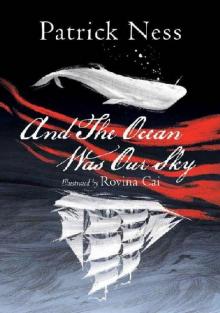 And The Ocean Was Our Sky
And The Ocean Was Our Sky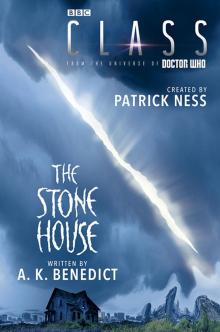 The Stone House
The Stone House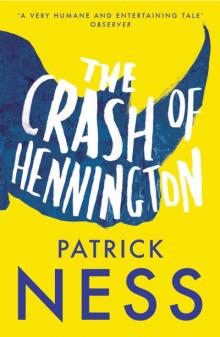 The Crash of Hennington
The Crash of Hennington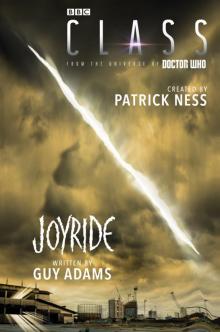 Joyride
Joyride What She Does Next Will Astound You
What She Does Next Will Astound You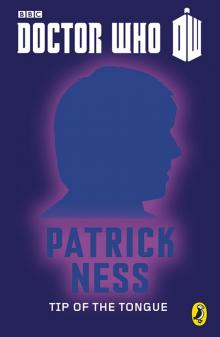 Tip Of The Tongue
Tip Of The Tongue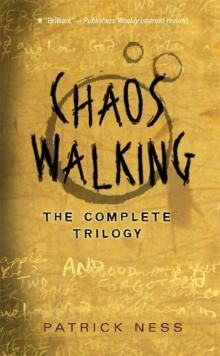 Chaos Walking
Chaos Walking